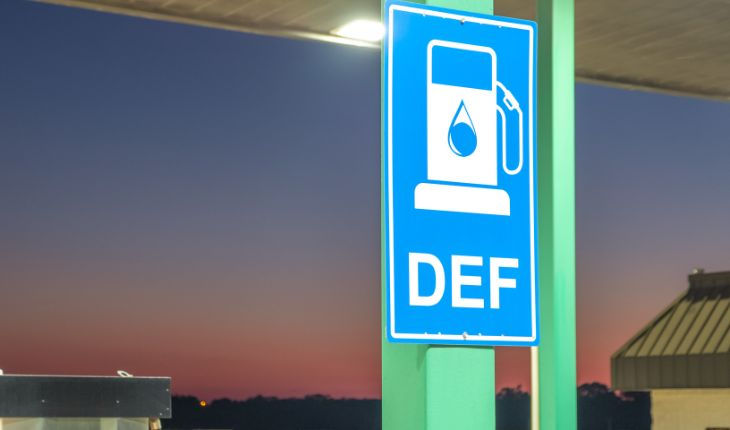Diesel Exhaust Fluid Market: Growth, Trends, and What Businesses Should Know
- Sophia Grace
- Sep 3, 2025
- 4 min read

Stricter emission regulations and a global push toward cleaner air have transformed how diesel engines are designed and maintained. One of the most important innovations driving this change is diesel exhaust fluid (DEF). This simple yet powerful solution is reshaping the transportation, agriculture, and industrial sectors by making diesel engines cleaner and more compliant.
The diesel exhaust fluid market has been expanding rapidly, driven by environmental regulations, technological advancements, and the growing demand for sustainable fuel solutions. Let’s dive into what DEF is, why it matters, and where the market is headed.
What Is Diesel Exhaust Fluid?
Diesel exhaust fluid is a non-toxic liquid composed of 32.5% high-purity urea and 67.5% deionized water. It is injected into the exhaust stream of diesel vehicles equipped with selective catalytic reduction (SCR) technology.
The fluid helps convert harmful nitrogen oxides (NOx) — a major contributor to air pollution — into harmless nitrogen and water vapor. This process dramatically reduces emissions and allows diesel engines to meet strict environmental standards.
Why the Diesel Exhaust Fluid Market Is Growing
Several factors are fueling growth in the diesel exhaust fluid market:
Stringent emission regulations: Governments across Europe, North America, and Asia-Pacific are enforcing strict NOx limits, making DEF essential for compliance.
Rising diesel vehicle production: Trucks, buses, and agricultural machinery remain heavily diesel-dependent, ensuring steady demand.
Increased logistics activity: The surge in e-commerce and cross-border trade is expanding the global trucking sector, boosting DEF consumption.
Environmental awareness: Businesses are under pressure to adopt greener practices, and DEF offers a cost-effective compliance solution.
Market Segmentation
By Vehicle Type
Commercial vehicles: Long-haul trucks and delivery fleets are the largest consumers of DEF.
Passenger vehicles: Diesel-powered cars in certain regions also use DEF to meet emission standards.
Off-road vehicles: Construction and agricultural equipment contribute significantly to demand.
By Supply Mode
Packaged DEF: Small containers for retail sales and individual use.
Bulk DEF: Large volumes supplied directly to fleets and fuel stations.
Dispensers at fueling stations: Increasingly common, especially across North America and Europe.
By Region
North America: A mature market with widespread DEF infrastructure.
Europe: Strong regulatory environment driving steady demand.
Asia-Pacific: Fastest-growing market due to rising industrialization and adoption of emission standards.
Key Trends Shaping the Diesel Exhaust Fluid Market
Integration with Fleet Management
Modern fleet operators are using digital tools to track DEF consumption, ensuring vehicles remain compliant and reducing the risk of downtime.
Growing Adoption in Agriculture and Construction
Off-road diesel equipment is increasingly regulated, creating new demand streams for DEF in non-transport sectors.
Focus on Infrastructure Expansion
Fuel stations are rapidly expanding DEF dispensing options to make access more convenient for commercial drivers.
Potential Transition to Alternative Fuels
While electric and hydrogen vehicles may eventually reduce diesel reliance, DEF demand is expected to remain strong in the medium term as heavy-duty transport is slower to electrify.
Benefits of Diesel Exhaust Fluid
For businesses operating diesel fleets, DEF offers clear advantages:
Regulatory compliance: Essential for meeting emission standards.
Operational efficiency: SCR systems often improve engine performance and fuel efficiency.
Sustainability: Reduces harmful emissions, supporting ESG and corporate responsibility goals.
Wide availability: Increasingly accessible through bulk suppliers and fueling stations.
Challenges in the Diesel Exhaust Fluid Market
Despite strong growth, challenges exist:
Price volatility: Urea prices, a key component of DEF, are linked to agricultural and energy markets.
Storage and handling: DEF is sensitive to temperature extremes and requires proper storage infrastructure.
Awareness gaps: Smaller fleet operators and rural users may lack understanding of DEF’s importance and correct use.
Addressing these challenges will be crucial for ensuring smooth adoption across industries.
The Future of the Diesel Exhaust Fluid Market
Looking ahead, the DEF market will continue to grow alongside the global diesel vehicle fleet. While alternative fuels and electrification are advancing, heavy-duty trucks, ships, and off-road equipment are expected to rely on diesel for decades.
In the short to medium term, the diesel exhaust fluid market will benefit from:
Stricter global emission laws
Expanding distribution networks
Increased fleet digitalization
Emerging markets in Asia and Latin America
DEF is likely to remain a key player in bridging the gap between traditional diesel engines and the greener technologies of tomorrow.
FAQs About the Diesel Exhaust Fluid Market
Q1: What happens if a diesel vehicle runs out of DEF?Most modern vehicles will either limit performance or fail to start until DEF is refilled, ensuring compliance with emission standards.
Q2: Is diesel exhaust fluid the same as diesel fuel?No. DEF is a separate liquid used in the exhaust system, not a fuel additive. Mixing it with diesel fuel can damage the engine.
Q3: Can DEF freeze in cold weather?Yes, DEF can freeze below -11°C (12°F). However, vehicles are designed with heating systems to thaw DEF tanks automatically.
Q4: How long does DEF last in storage?When stored properly in sealed containers and away from sunlight, DEF typically has a shelf life of up to two years.
Q5: Who are the major players in the diesel exhaust fluid market?Leading companies include Yara International, BASF, Shell, Cummins Filtration, and TotalEnergies, among others.









Comments